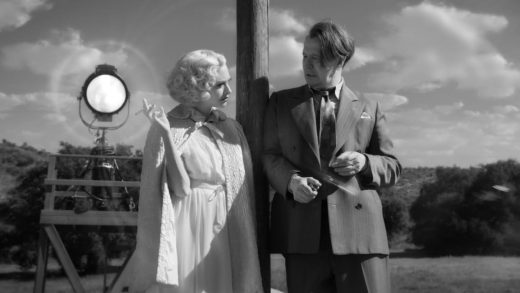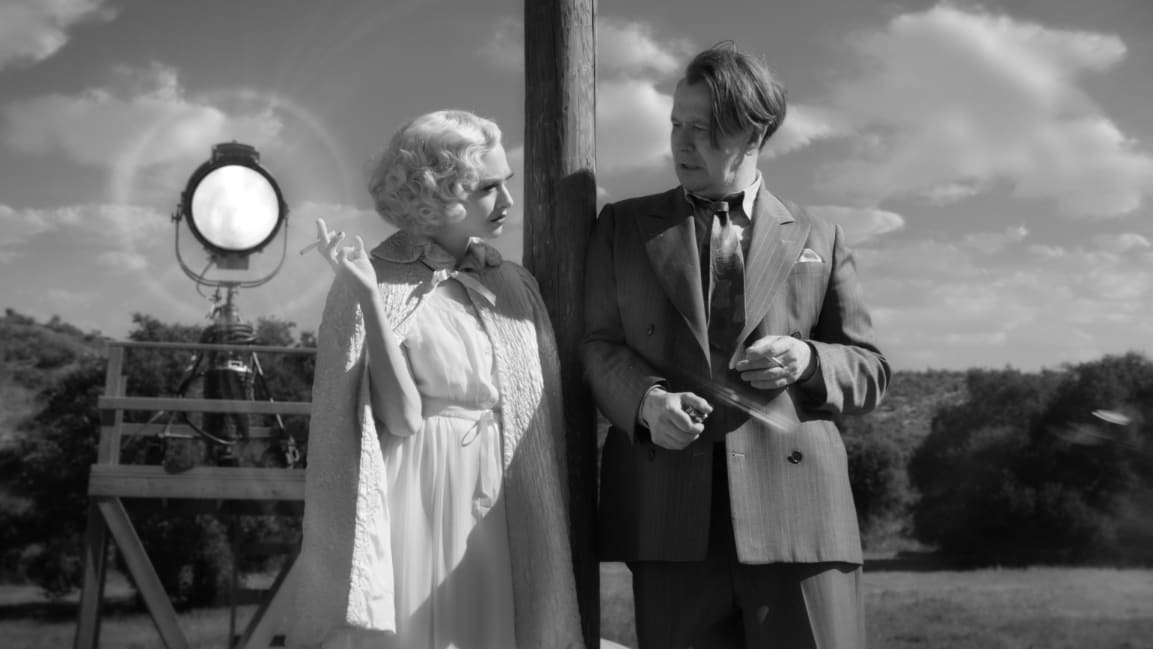In reluctant defense of ‘Mank,’ this year’s Oscars villain
In the most reductive terms, movies follow heroes as they square off against villains. Sometimes, they’re antiheroes. Very rarely anti-villains. It’s only natural, though, that movie awards would have villains too.
Every year, the Oscars narrative coalesces around one movie as the cineastes’ punching bag. It’s usually one that’s seen as either unfairly overshadowing a worthier contender, or simply undeserving of its gold-garlanded stature. The black hat last year belonged to Joker, which picked it up from the previous year’s Green Book, which borrowed it from Three Billboards. Sometimes these villains are thwarted, like when Moonlight bested La La Land in 2017, and sometimes they triumph, as when Green Book beat out both frontrunner Roma and admitted longshot Black Panther in 2019. This year’s Oscars villain, however, is more of an anti-villain—and arguably doesn’t deserve the animosity it’s been getting.
On its surface, the eminently memeable Mank has all the ma(n)kings of an Oscars supervillain: Its premise, the story behind the making of Citizen Kane, sounds boring as hell; its black-and-white palette and slavish devotion to Old Hollywood techniques scan as pretentious; the fact that director David Fincher’s late father, Jack, wrote the screenplay smacks of self-indulgence; its Old Hollywood setting seems like yet another Oscar-bait tribute to the glory of The Movies; lead actor Gary Oldman has a problematic past; it arrived predictably on a flood of critical acclaim and ended up with the Goliath factor of this year’s most nominated film; and in an #OscarsSoWhite world, Mank has pretty much zero nonwhite speaking roles.
As a result of all of these perceived debits, it is now generally considered hip to roll one’s eyes at Mank while allowing that Amanda Seyfried gives a killer performance, during which she uses the phrase “Nerts!” a couple of times. (It’s apparently old-school Brooklynese for ‘Nuts!’) Despite the film’s enviable score on Rotten Tomatoes, a lot of critics have privately trashed it on Twitter and Letterboxd. It’s gotten to the point where some critics can’t even say that they enjoyed Mank without doing a little ironic acknowledgement of its tarnished status among the cognoscenti first. Hell, even The Onion weighed in on the brewing antipathy with this recent headline: “Nation Unable To Quell Insatiable Appetite For All Things ‘Mank.’” Anyone who has not yet seen the film but is aware of all this baggage could understandably conclude that it is not worth ever seeing, and actively root against it.
The only problem is that the movie itself is nothing like its current reputation suggests.
Yes, it does star Oldman, and, sure, its cast is blindingly alabaster, and, okay, it may not be the year’s Best Picture. But Mank does not deserve to be the villain of this year’s crop of Oscar contenders.

[Photo: courtesy of Netflix]
Mank is the story of how screenwriter Herman Mankiewicz—a falling-down-drunk degenerate gambler—came to write one of the greatest movies of all time. Its story, however, is distinct from what the film is actually about, which is the blurring of entertainment and politics, and one man’s battle for his own soul. Like Citizen Kane, it flits around different time periods, but mainly in between the writing of that film in 1940 and the events that inspired it over the previous decade. Charles Foster Kane is famously based on the newspaper baron and political dabbler William Randolph Hearst (played here by Charles Dance), with whom Mank had a personal connection in real life. The reasons for Mank’s eventual falling out with Hearst, and the fallout from it, turn out to be just about as interesting as anything that happens in Citizen Kane.
As Vox points out, “[Mank’s] target audience is almost impressively niche: cinephiles, film critics, and people who are deeply interested in the history of Hollywood circa 1940.” But as stuffy as that accurate description sounds, this is an incredibly entertaining movie. The dialogue sparkles, with just about every character engaging in witty repartee, their rat-a-tat verbal sparring sessions like the speed chess in The Queen’s Gambit. A lot of the scenes set in 1930s-era studio backlots have a propulsive energy that zips along fast, powered by a jazzy big-band score, and the continually shifting narrative keeps viewers on their toes and engaged. Also, any actually pretentious movie would probably have fewer visual puns.
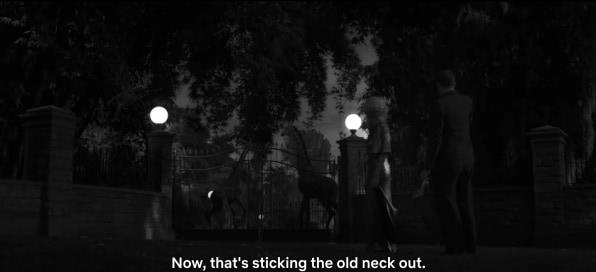
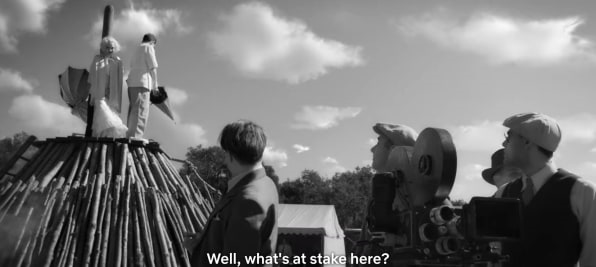
The fundamental misunderstanding about Mank, though, is that it’s another self-congratulatory ode to the magic of movies—a worthy successor to The Artist and Argo and Once Upon a Time. . . In Hollywood, and so forth. That is simply not the case. Mank is far more critical than it is starry-eyed. If anything, it’s an indictment of movie magic, and a fiery polemic against Old Hollywood. Dismissing it on the grounds of its inward-looking subject matter would mean missing out on timely, relevant discussions about union-busting corporate overlords and political propaganda.
In the film, and in real life, the heads of MGM—Louis B. Mayer (Arliss Howard) and Irving Thalberg (Ferdinand Kingsley)—team up with Hearst in an overarching campaign against author and activist Upton Sinclair (Bill Nye!) in his bid to become governor of California. Although the Hollywood of today leans overwhelmingly liberal, up until the WWII era its movers and shakers tended to be right-wingers. Their efforts to conflate the burgeoning Screen Actors Guild with communism and use Sinclair’s socialist bona fides against him remain sadly relevant in 2021. We see them put up billboards, splash stories in the paper about how Sinclair’s policies will ruin Hollywood, and, most gallingly, make a series of fake newsreels with underemployed actors posing as everyday citizens explaining why they won’t be voting for the socialist Sinclair. In real life, those newsreels were said to be the death blow for his campaign.
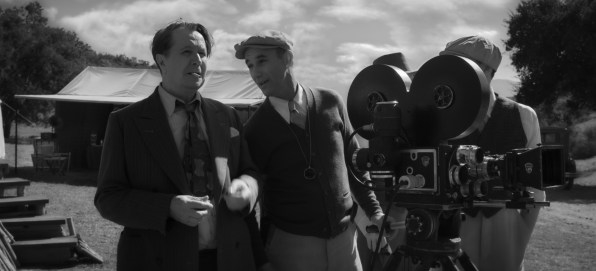
[Photo: courtesy of Netflix]
“If you give people what they need to know in an emotional way, you can expect they’ll do the right thing,” Mayer tells Mank of Sinclair’s loss.
“I think you mean if you keep telling people something untrue loud enough and long enough, they’re apt to believe it,” Mank retorts, quoting Nazi propaganda maestro Joseph Goebbels.
At a moment when the Fox News-to-Congress feedback loop is more evident than ever, it’s fascinating to see the original sin of media manipulation in America play out on-screen. This is far away from a La La Land-like rose-tinted depiction of Tinseltown.
Taste is subjective, and no one can say definitively that Mank is good. However, to automatically relegate it to an Oscars villain suggests, in its own way, the very same passive acceptance of a narrative that the movie cautions against. Nerts to that!
Fast Company , Read Full Story
(8)

